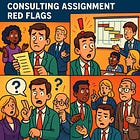Consulting Tip #10: The Hidden Skill of Letting Go
How to focus on what matters, skip the rest, and protect your energy in consulting—and life
One of the harder lessons I’ve learned—in consulting and in life—is this:
Sometimes, the smartest move is not to care too much.
Sounds counterintuitive, right? We’re told to be committed, deliver excellence, and take ownership. And those things are important. But there’s a fine line between caring enough to do great work—and caring so much that it drains your energy, impacts your health, or ties your self-worth to things you can’t control.
Why This Matters—in Work and in Life
Consulting comes with built-in intensity: high expectations, shifting priorities, last-minute surprises. Life has its own version of the same—family demands, world events, and the unexpected.
In both cases, the key is the same: what’s officially agreed and truly important comes first.
In consulting, that means what’s in your contract, scope, and official priorities.
In life, that means the essentials you and your loved ones need to feel secure and survive, other commitments you’ve consciously made, and the values you’ve chosen to stand by.
Everything else? Worth weighing more carefully before you give it your best energy.
Knowing Where to Invest Your Energy
In consulting—and in life—you can’t give 110 % to everything without burning out. The art is knowing where to focus your effort and when to step back. Some situations are worth all your attention; others call for doing your best, documenting your part, and then letting go.
A quick self-check can help:
Is this part of my official priorities or commitments?
Will it matter in six months?
Is it within my control—or just in my sphere of concern?
Does the client, manager, or key stakeholder actually care about this as much as I do?
If the answer is no to most of these, deliver what’s reasonable, but don’t let it consume you.
Real-Life Examples: When to Care Less (and Why It’s Okay)
As said, not every situation in consulting is worth maxing out your effort or stress levels. Some challenges are best met with a pragmatic approach—deliver what’s needed, protect your boundaries, and keep perspective. Here’s what that can look like in practice:
The impossible deadline. Despite everyone’s best efforts, the scope simply doesn’t fit the time. Escalate early, do solid work, and let leadership manage expectations with the client.
The “perfect” slide deck. Your client needs clear recommendations, not an extra three hours of pixel-perfect alignment.
Office politics. You can’t control every decision—or every perception. Stay professional, keep relationships healthy, move on, and keep your Plan B ready.
The last-minute change request. If it’s not feasible without sacrificing quality elsewhere, push back diplomatically and propose realistic alternatives.
The meeting that should’ve been an email. Participate constructively, but don’t overprepare or let it consume your day.
Shifting corporate priorities. If leadership pivots away from an initiative you’re deeply invested in, channel your energy into what is now a priority—without taking it personally.
Knowing when to care less isn’t about apathy—it’s about conserving your energy for the moments, projects, and relationships that actually move the needle. The rest? Handle it well, then let it go.
The Career Safety Net: Have a Plan B
Just like in life it’s wise to have financial reserves or other safety nets, the same principle applies in your career. Options give you freedom—and peace of mind.
Even if you’re fully committed to your current role, it’s healthy to keep the door open for future moves. That means:
Keep your skills sharp and relevant—so you stay marketable.
Maintain a network beyond your current project or employer.
Stay aware of other opportunities—not to leave at the first chance, but to avoid feeling trapped.
When you know you have a Plan B, you bring more perspective and less panic to challenges. It’s easier to let go of the small stuff and focus on what truly matters.
Final Thoughts
When you stop over-caring about things that don’t truly matter, you:
Protect your focus for what does matter
Stay calmer and more resilient
Avoid slow-burn frustration and burnout
The best consultants—and the most grounded people—aren’t the ones who fight every battle. They’re the ones who choose their battles well.
💡 Pro Tip: Treat your energy like a project budget. Spend it where it moves the needle—and where you’ve agreed to spend it.
👉 Have you learned to “not care” about certain things in your work or life? How did it help you?
See you next time,
Eetu Niemi
IT Consulting Career Hub
📚 Related Reads from the IT Consulting Career Hub
If this topic resonated with you, you might also enjoy:





